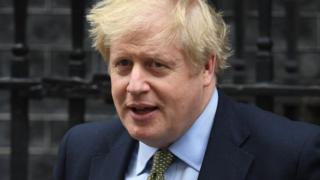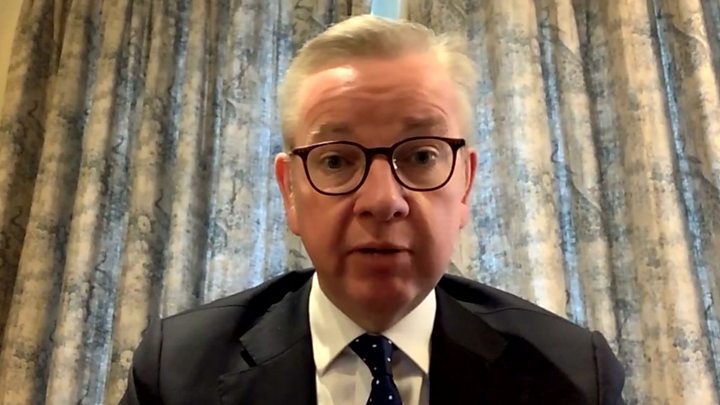Coronavirus: Boris Johnson 'in good spirits' and is stable in hospital
 Image copyright
PA Media
Image copyright
PA Media
Boris Johnson is "in good spirits" after spending the night in intensive care being treated for coronavirus, according to a No 10 spokesman
He said the prime minister, 55, was stable overnight and is being given oxygen - and was not on a ventilator.
It comes as Cabinet Office minister Michael Gove became the latest politician to self-isolate after a family member showed symptoms.
Mr Gove said he did not have symptoms and will continue working at home.
Mr Johnson was admitted to St Thomas' Hospital in central London with "persistent symptoms" of Covid-19 on Sunday and was moved to intensive care on Monday at 19:00 BST after his symptoms worsened.
In a statement on Tuesday, a Downing Street spokesman said: "The prime minister has been stable overnight and remains in good spirits. He is receiving standard oxygen treatment and is breathing without any other assistance.
"He has not required mechanical ventilation or non-invasive respiratory support."
A ventilator takes over the body's breathing process when disease has caused the lungs to fail.
Speaking to BBC Radio 4's Today programme earlier, Mr Gove pledged that if there is any change in his condition "No 10 will ensure the country is updated".
Meanwhile, world leaders including Russia's President Vladimir Putin and US President Donald Trump have sent messages to Mr Johnson wishing him well.

Foreign Secretary Dominic Raab is deputising for the PM and chaired the government's daily coronavirus meeting on Tuesday.
As first secretary of state, Mr Raab is the minister designated to stand in for Mr Johnson if he is unwell and unable to work.
Mr Raab said earlier there was an "incredibly strong team spirit" behind the prime minister and that he and his colleagues were making sure they implemented plans that Mr Johnson had instructed them to deliver "as soon as possible".
Some politicians have called for greater clarity on what Mr Raab's role as deputy entails, including Tory MP Tobias Ellwood who asked for details "as to where responsibility for UK national security decisions now lies".
Lord Heseltine, who served as deputy prime minister under John Major, said it will be a "very difficult personal position" for Mr Raab, who "will be tested by the loneliness of the job".
"He will be surrounded by lots of people who know what Boris Johnson said, believe Boris will be quickly back and have their own personal agendas anyway," he said.
Mr Johnson was initially taken to hospital for tests after announcing 11 days ago that he had the coronavirus. His symptoms included a high temperature and a cough.
Mr Gove is the latest cabinet minister to self-isolate, after Mr Johnson, Health Secretary Matt Hancock and Scottish secretary Alister Jack.
The government's chief medical adviser Prof Chris Whitty and the PM's adviser Dominic Cummings also spent time self-isolating after showing symptoms.
In other developments:
How have you been affected by the issues relating to coronavirus? Share your experiences by emailing haveyoursay@bbc.co.uk.
Please include a contact number if you are willing to speak to a BBC journalist. You can also contact us in the following ways: